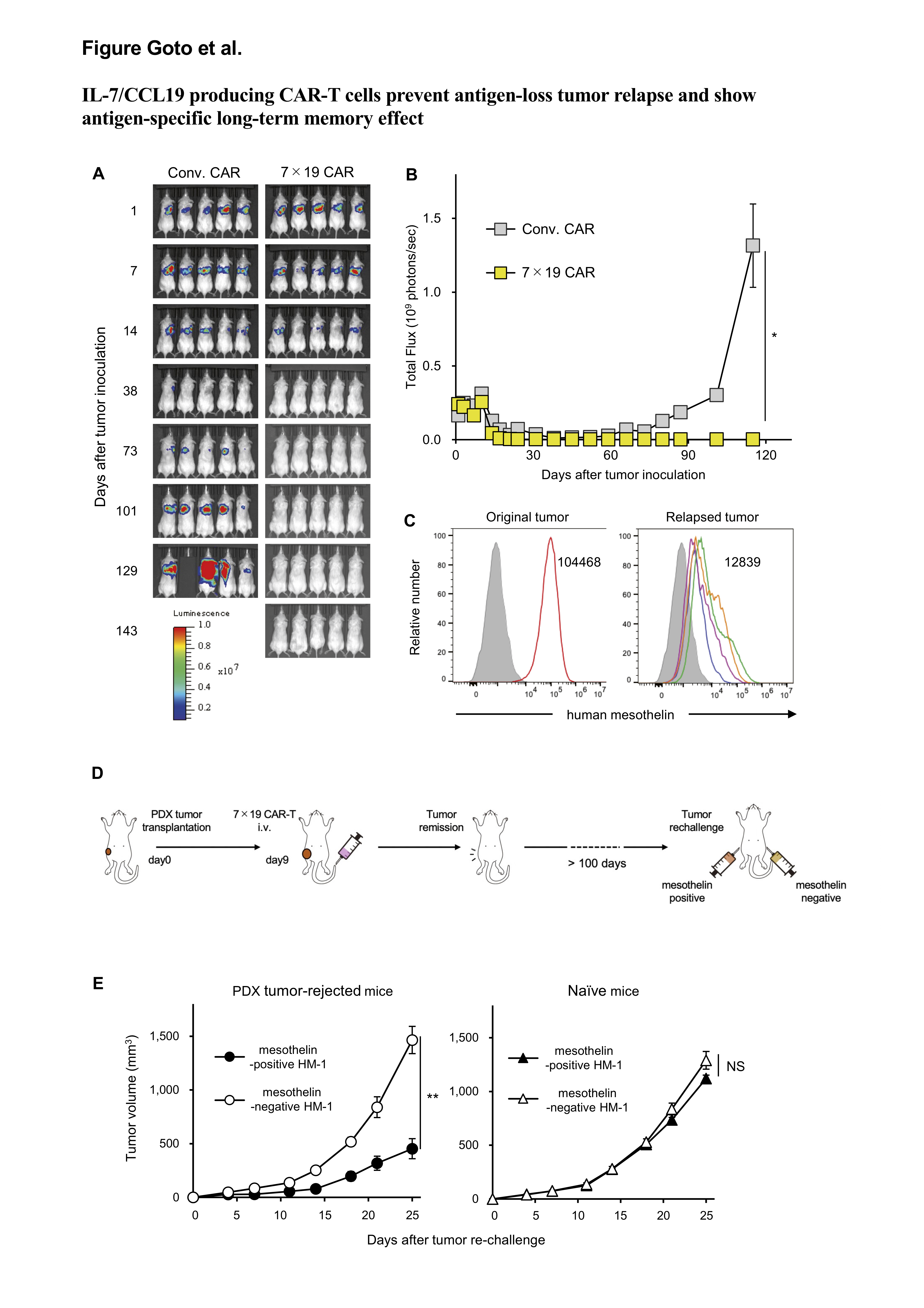Back
Poster, Podium & Video Sessions
Moderated Poster
MP12: Kidney Cancer: Advanced (including Drug Therapy) I
MP12-03: IL-7 and CCL19 producing CAR-T cells prevent antigen-loss tumor relapse and enhance antitumor efficacy against solid cancer
Friday, May 13, 2022
1:00 PM – 2:15 PM
Location: Room 222
Shunsuke Goto*, Fukuoka, Japan, Koji Tamada, Ube, Japan, Masatoshi Eto, Fukuoka, Japan
- SG
Shunsuke Goto, MD, PHD
Kyushu University
Poster Presenter(s)
Introduction: While chimeric antigen receptor (CAR)-T cell brought a breakthrough to the treatment for hematological cancer, most CAR-T cell therapies failed to treat solid cancers. We recently reported that mouse CAR-T cells modified to produce interleukin- (IL)-7 and CCL19 (7×19 CAR-T cells) enhance the therapeutic efficacy against solid tumors by recruiting not only administered CAR-T cells but also endogenous T cells and DCs into tumors. Further, we reported that human 7×19 CAR-T cells show enhanced antitumor efficacy against PDX tumor expressing mesothelin, for which 10% of renal cell carcinoma are positive. In this research, we focus on the mechanism of antitumor activity of 7×19 CAR-T cells and object to prevail the difference between conventional CAR-T cells (Conv.) and 7×19. Another hurdle of CAR-T cell therapy is adverse event arising from unspecific reaction to normal tissues and organs. In this regard, we investigated the antigen-specific activity of 7×19 CAR-T cells by conducting a tumor rechallenge experiment.
Methods: We produced a novel anti-human mesothelin 7×19 CAR-T cells, then assessed the antitumor activity against solid tumor in vivo using a malignant mesothelioma orthotopic tumor model. Tumor was resected after the administration of CAR-T cells and surface expression levels of mesothelin were measured by flowcytometry. Tumor rechallenge experiment was done using PDX tumor model.
Results: 7×19 CAR-T cells rejected the orthotopic tumor, while Conv. CAR-T cells allowed the tumor relapse. The surface expression of mesothelin on those relapsing tumors were declined from original tumors, which suggested that 7×19 CAR-T cells prevented the relapse of antigen-loss tumors. In the rechallenge trial, mesothelin-positive tumor progression was specifically suppressed in mice which had rejected mesothelin positive PDX tumors by the treatment with 7×19 CAR-T cells.
Conclusions: It was found that the enhanced antitumor potential of human anti-mesothelin 7×19 CAR-T cells are antigen-specific and show a long-term memory effect. Further, 7×19 CAR-T cells can solve one of the important clinical problems, antigen-loss tumor relapse. These data support that this therapy will be a new treatment option for patients with mesothelin-positive renal cell carcinoma.
Source of Funding: This study was supported by Practical Research for Innovative Cancer Control, and Project for Cancer Research and Therapeutic Evolution (P-CREATE) 16770206 by Japan Agency for Medical Research and Development (AMED), and Japan Society for the Promotion of Science Grant-in-Aid for Scientific Research (C) Grant Number 19K07625.

Methods: We produced a novel anti-human mesothelin 7×19 CAR-T cells, then assessed the antitumor activity against solid tumor in vivo using a malignant mesothelioma orthotopic tumor model. Tumor was resected after the administration of CAR-T cells and surface expression levels of mesothelin were measured by flowcytometry. Tumor rechallenge experiment was done using PDX tumor model.
Results: 7×19 CAR-T cells rejected the orthotopic tumor, while Conv. CAR-T cells allowed the tumor relapse. The surface expression of mesothelin on those relapsing tumors were declined from original tumors, which suggested that 7×19 CAR-T cells prevented the relapse of antigen-loss tumors. In the rechallenge trial, mesothelin-positive tumor progression was specifically suppressed in mice which had rejected mesothelin positive PDX tumors by the treatment with 7×19 CAR-T cells.
Conclusions: It was found that the enhanced antitumor potential of human anti-mesothelin 7×19 CAR-T cells are antigen-specific and show a long-term memory effect. Further, 7×19 CAR-T cells can solve one of the important clinical problems, antigen-loss tumor relapse. These data support that this therapy will be a new treatment option for patients with mesothelin-positive renal cell carcinoma.
Source of Funding: This study was supported by Practical Research for Innovative Cancer Control, and Project for Cancer Research and Therapeutic Evolution (P-CREATE) 16770206 by Japan Agency for Medical Research and Development (AMED), and Japan Society for the Promotion of Science Grant-in-Aid for Scientific Research (C) Grant Number 19K07625.


.jpg)
.jpg)